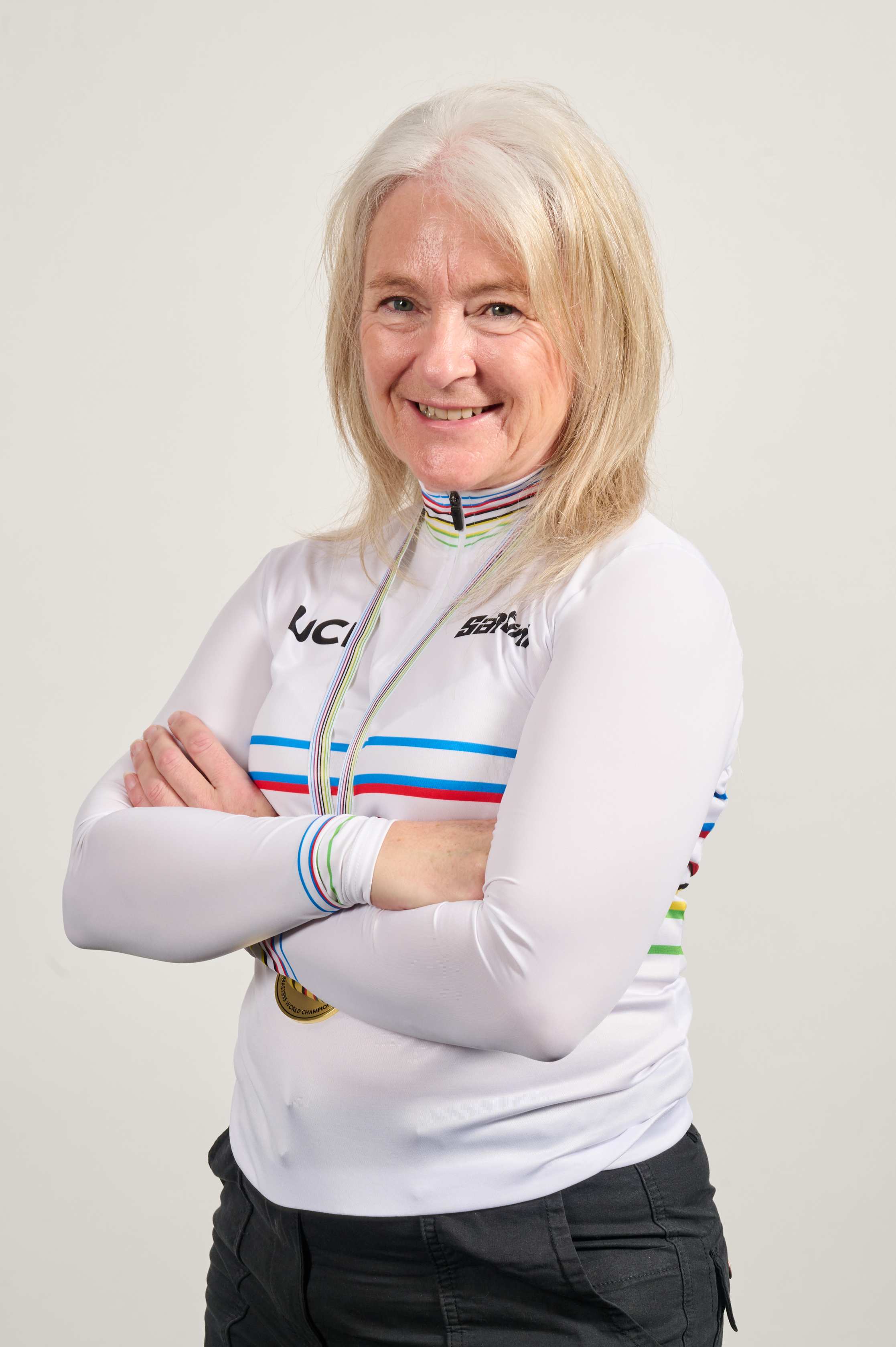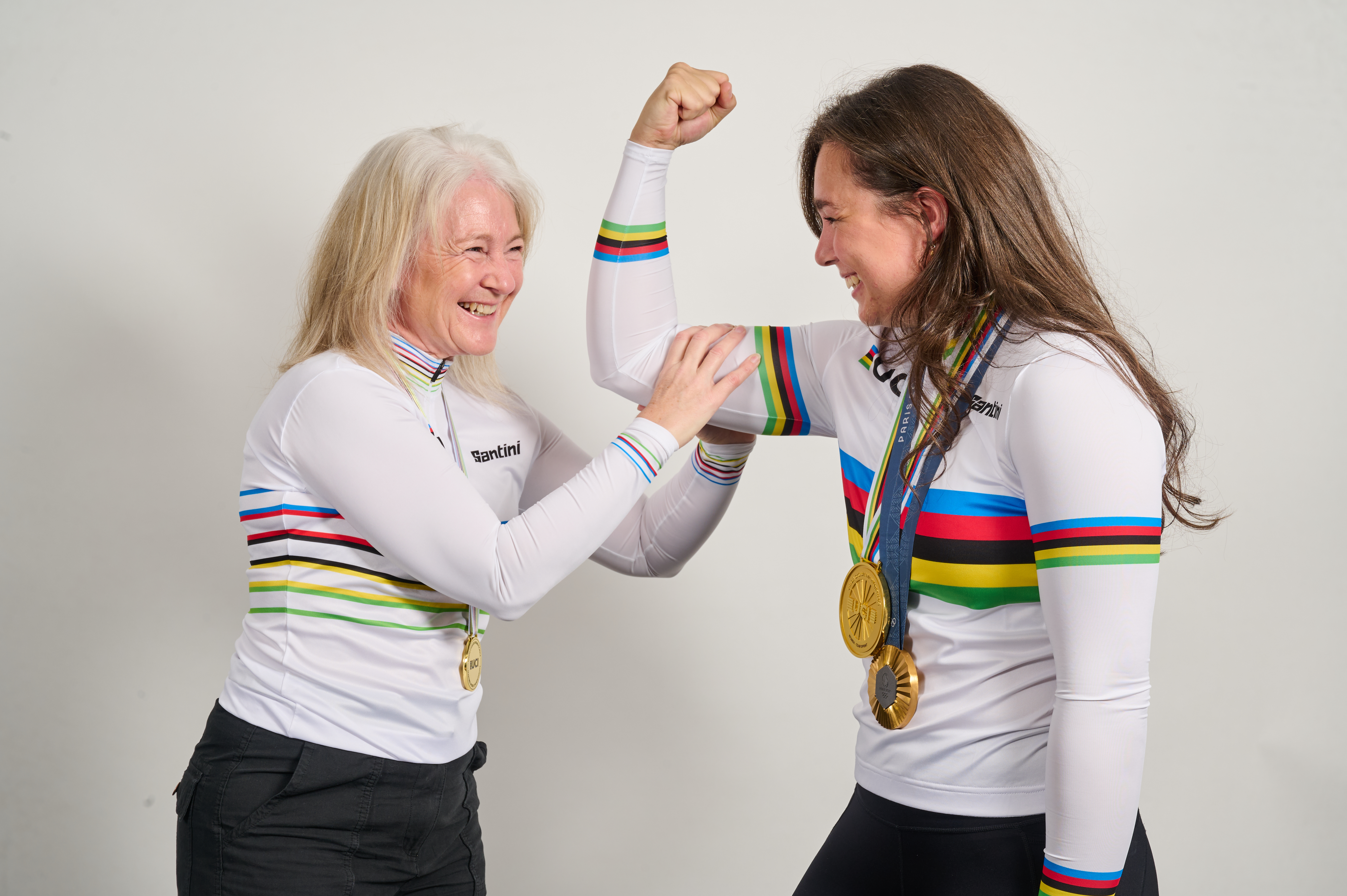Last October, Sophie Capewell and her mother Debbie both won world titles in track cycling, just two weeks apart. It’s a feat that few parent-child pairings can claim to have achieved, but one that, for a passionate cycling family like the Capewells, seemed almost inevitable. What’s more, the duo won their titles in the same event – the team sprint – Sophie at the UCI Track World Championships in Copenhagen, Denmark, and Debbie at the Masters equivalent in Roubaix, France. Debbie also claimed another in the team pursuit, for good measure.
The victories came in an already golden year for the family. On her Olympic debut, in August, 26-year-old Sophie charged to her maiden title as part of Team GB’s sprint squad. After the race, she pulled up along the barrier in tears, and hugged her mother and older sister, Emily, both wearing matching Union Jack bucket hats.
The two sisters’ father, Nigel, died less than three years before the Paris Olympics. He and Debbie had met through cycling in the Nineties, and he went on to become a two-time Paralympian, competing on the track and road at the 1996 Games in Atlanta, and in Sydney four years later. Following his retirement, Nigel continued as a well-loved coach at Lichfield City Cycling Club, where an endeavour trophy is now awarded in his name each year.
For this ‘Meet the Maker’, we met with Sophie and Debbie to find out how they’re building on the family legacy.
Sophie Capewell
(Image credit: Richard Butcher)
Age: 26
Height: 5ft 7in
Born: Lichfield, Staffordshire
Occupation: Track sprinter
Biggest sporting achievement: 1st – team sprint, Olympic Games (2024)
How sporty was your upbringing?
Extraordinarily. I don’t remember ever not doing sport. I think we did nearly every sport under the sun. The way we got into sport was because Mum and Dad were either coaching at the local cycling club or going out on their bikes.
The latest race content, interviews, features, reviews and expert buying guides, direct to your inbox!
What did you want to be?
I wanted to be world and Olympic champion. I used to recite it anytime anyone would ask me – I think it’s because my parents made me feel that it was possible. We all loved sport growing up, so of course that was the future I wanted. Last year I finally achieved my childhood dream, but there are other events where it would be cool [to win gold]. There’s more that I want to win.
What sporting attributes have you inherited from your mum?
We’re both pretty competitive, that’s the main one. We also both have a big passion for cycling, and we have that in common in buckets. She was racing the sprint while I was racing the sprint, so the sprint side is something that we get to talk about a lot and share a common interest in.
How are you and your mum similar as cyclists?
We’re both good at starting [out the gates]. We’re also both quite tactical riders and enjoy that side of things. We don’t ride a lot on the track together (“because she scares me,” Debbie interjects). The last time I took her out was not the nicest.
How are you different as cyclists?
I think I problem-solve a little bit more and look at the race in a slightly different way. She’s more of an artist in thinking about the race, whereas I think of it more in an analytical sense. Oh, and I ride really big gears.
Are you similar personality-wise?
Yes and no. We’re both extremely stubborn, which is a blessing and a curse, I guess. I would argue that I’m probably a lot more outgoing and confident. She’s a little bit more introverted, which is not a negative thing.
How do your approaches to training compare?
I’m quite regimented, and if it’s written down, I feel like I have to do it. I’m a big rule-follower. If something was always in my plan, I have to do it, whereas she goes off feel a lot more. That’s something mum’s helped me with a little bit as well. We’re both pretty good at switching on when we need to.
In what way has your mum influenced your career?
I find it hard to describe because I don’t know what I would be without her. It’s not like I started cycling at 14, and the influence started at that age – she’s just always been there. I think because Mum cycles and Dad used to as well, they made me feel like everything was possible to do. The other thing is that I had so many female role models growing up, including my mum, that I didn’t really clock the gender gap until I was older. My mum had big strong quads, like me, and I had other female influences because she was riding with other women.
What’s your personal philosophy towards sport?
It’s the best thing ever. I love to win. Obviously everybody loves to win, but I want to be the best. When we were growing up, my dad used to say, “Always aim to win. Don’t aim for third, because you’ll get fourth.” That was his experience of it. [Nigel Capewell finished fourth at the 1996 and 2000 Paralympics]. Maybe this is where my sport philosophy comes from, but I always want to win in everything I do now.
Describe your mum in three words.
Stubborn. Determined. Helpful.
Debbie Capewell

(Image credit: Richard Butcher)
Age: 59
Height: 5ft 5in
Born: Walsall, West Midlands
Occupation: Retired nurse
Biggest sporting achievement: 5x gold medallist UCI Masters Track World Championships
Talk us through your cycling accolades.
My sister [Julie] and I won the team sprint in 2015, and we’ve had a couple of silver medals. I had always been a bit of a bridesmaid and had a fair few silvers, but in 2023, I won my first individual Masters Track World Championships title. I also won the team sprint in 2023 and 2024, and we won the team pursuit last year, as well.
Did you have sporty parents?
My dad used to cycle and was in a club when he was a schoolboy, but my sport was showjumping. We had horses, so I didn’t really come into cycling until my late-20s, when I finished with the horses. My dad built me a bike and said, “Come on, we’ll ride the local 10[-mile time trial].” And that’s where it all began, really. We used to go out on club runs and things like that. He was quite competitive.
When and how did you get into track cycling?
I met my husband Nigel at the Divisional Road Race Championships, and he ended up coaching me. The first time I got on the track was in 1996, just before we got married, and that was my first experience. It’s been my thing ever since, although I’ve dabbled in everything else.
What does your training consist of these days?
I do sessions at Derby Velodrome twice a week, but I’m not so regimented. I go to the gym twice a week – although I have to be a bit careful now – and I go out on the roads. I can do what I want, really. Obviously I’m not lifting 140kg!
What advice have you tried to pass onto Sophie?
Enjoy it, first and foremost. I always say to her, especially where the gym is concerned, “You’re not a weightlifter, so don’t risk getting injured. You’re a cyclist at the end of the day. Stay healthy and be the best you can be.” I think Sophie’s pretty switched on with what she does, but sometimes she needs to have more belief in herself. She’s got one of these magical brains that works things out, it’s just giving her the belief to go and do it.
Sophie raced mountain bike and cyclo-cross as a child – could she have specialised in one of these disciplines?
She was pretty good, considering as a youth she did multiple sports. The only thing she couldn’t do was climb hills. I think she could probably do the endurance part of the track, because I think she’s got a good racing brain.
Do you ride for a team now?
Yes, I ride for Team Ohten Aveas. The team was set up originally pre-Covid, and it’s got a big passion for the team pursuit. They want to prove that age is no limit, and they’ve been fantastic support for me. It’s a good bunch of older people who want to dominate. They’ve said the next thing they would like to do is branch to helping a women’s team as well. There aren’t so many masters women, but I think it’s great. It’s given me a lease of life. I’m still learning, I’m doing something different, and I’m keeping fit, so it’s brilliant.
What is the trick to winning world titles in your fifties?
Hard work, enjoyment and belief.
Describe Sophie in three words.
Determined. Strong. Stubborn.
The no-conferring round

(Image credit: Richard Butcher)
Guess what your mum said when we asked…
What is the one thing Sophie can do that Debbie can’t?
Sophie: Lift heavy weights. I can lift a lot more than she can.
Debbie: Lift weights.
What is the one thing that Debbie can do that Sophie can’t?
S: She’s able to not train if she doesn’t feel like she needs to or wants to. But I’m like, “No, I have to do it.” That’s the big difference.
D: I’ve got patience and she hasn’t.
Would Sophie have made a good team pursuiter?
S: I think so, yes. But I think I can do anything!
D: I think she would have. The team pursuit has become faster over the years.
Whose discipline is tougher, Sophie’s sprinting or Debbie’s endurance events?
S: I think sprinting is tougher, because the mental side is tougher. If you’re not fully switched on, you’re not going to do well.
D: Sprinting. After you’ve done team pursuiting, when you go back to sprinting, there’s nothing like emptying the tank and how much it hurts.
Who is better at riding outdoors?
S: Currently Mum because I’ve not done it in a long time. She’s not as heavy, so I think that really helps. We need to go on a ride together and figure this one out.
D: Me. She’s on the track all the time!
How does Debbie feel watching Sophie race?
S: Nervous. There are some good pictures of her trying to not look. I think I scare her a little bit. She’s very proud as well.
D: It’s horrendous. I can find myself hiding under seats and all sorts of things. If it doesn’t go well, I live every pedal stroke with her.
Who will win more world titles in their careers?
S: I’m hoping I will. I’m going to go with me. I’m going to be bold and set the bar high for myself.
D: I think she’d like to think she could win more.
Who is more competitive?
S: Me. 100%. No doubt. I’ll be very surprised if she doesn’t say the same thing.
D: Sophie. No doubt.
This feature originally appeared in Cycling Weekly magazine on 6 March 2025. Subscribe now and never miss an issue.

